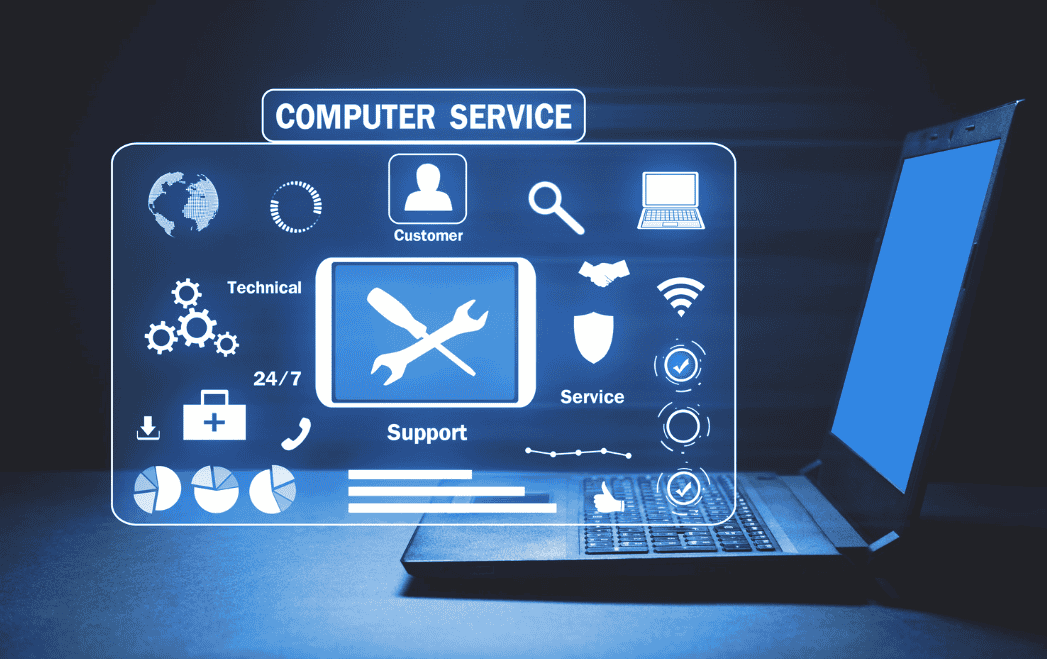In the realm of operational efficiency and seamless management, the role of managed services is indispensable. These services, provided by an IT Service Provider, offer tailored solutions that optimize processes, enhance reliability, and ensure continuity. This allows organizations to allocate resources more strategically and achieve their goals with confidence.
Definition of Managed Services
Managed services refer to the practice of outsourcing certain IT functions and responsibilities to a third-party service provider. These services are designed to proactively and efficiently manage a company's IT infrastructure, applications, and support. By partnering with a managed service provider (MSP), businesses can leverage the expertise and resources of the MSP to enhance their IT operations.
The scope of managed services can vary depending on the specific needs of the business. It can include services such as network monitoring, data backup and recovery, cybersecurity, help desk support, and more. The goal of managed services is to offload the day-to-day IT tasks and responsibilities, allowing businesses to focus on their core operations and strategic initiatives.
Overview of Managed IT Services
Managed IT services, a subset of managed services, specifically focuses on the management and support of a company's IT infrastructure. This can include network infrastructure, servers, storage systems, operating systems, and other IT components. The MSP takes on the responsibility of monitoring, maintaining, and optimizing these systems to ensure their smooth and secure operation.
By utilizing managed IT services, businesses can tap into the expertise of IT professionals who are well-versed in the latest technologies and industry best practices. This helps businesses stay up-to-date with the ever-evolving IT landscape, without the need for extensive in-house IT resources and knowledge.
Managed IT services provide businesses with a range of benefits, including cost-effectiveness, improved operational efficiency, enhanced security measures, and access to specialized expertise. Understanding the definition and scope of managed services, as well as the specific focus on managed IT services, is essential to comprehend how these services drive business success. In the following sections, we will explore the various ways in which managed services enhance operational efficiency, enable businesses to focus on core functions, and provide scalability and flexibility.
Benefits of Managed Services
Managed services offer a range of benefits for businesses seeking efficient and reliable IT support. From cost-effectiveness to enhanced security measures, these advantages make managed services a game changer for driving business success.
Cost-Effectiveness
One of the primary benefits of managed services is their cost-effectiveness. By outsourcing IT management to a managed service provider (MSP), businesses can reduce the need for in-house IT personnel and infrastructure expenses. Instead of bearing the burden of costly hardware and software investments, businesses can opt for a subscription-based model that aligns with their specific needs. This means predictable monthly costs and the ability to scale services as the business grows. The cost savings associated with managed services can then be redirected towards core business functions and strategic initiatives.
Proactive IT Management
Managed services provide businesses with proactive IT management, ensuring that potential issues are identified and addressed before they escalate into major problems. Through continuous monitoring of IT systems, managed service providers can detect and resolve issues remotely, often before users are even aware of them. This approach minimizes downtime, improves system availability, and enhances overall productivity. With the assistance of an MSP, businesses can focus on their core competencies, while leaving the management and maintenance of IT infrastructure in the hands of experts.
Enhanced Security Measures
In today's digital landscape, cybersecurity is of paramount importance. Managed services offer enhanced security measures to protect businesses from evolving threats. MSPs employ advanced security technologies, such as firewalls, intrusion detection systems, and encryption protocols, to safeguard sensitive data and prevent unauthorized access. Additionally, MSPs stay up-to-date with the latest security trends and regulations, ensuring that businesses remain compliant with industry standards. By entrusting IT security to professionals, businesses can mitigate risks and maintain the trust of their customers and stakeholders.
The benefits of managed services extend beyond cost-effectiveness, proactive IT management, and enhanced security measures. Improved operational efficiency, the ability to focus on core business functions, and scalability and flexibility are additional advantages that drive business success.

How Managed Services Drive Business Success
Managed services play a pivotal role in driving business success by providing numerous benefits and advantages. In this section, we will explore how managed services contribute to improved operational efficiency, allow businesses to focus on their core functions, and offer scalability and flexibility for growth.
Improved Operational Efficiency
By leveraging managed services, businesses can enhance their operational efficiency significantly. Managed service providers (MSPs) bring expertise, experience, and specialized tools to optimize and streamline IT operations. They help identify and address inefficiencies, reduce downtime, and improve overall system performance.
MSPs employ proactive monitoring and management tools to identify and resolve potential IT issues before they impact business operations. This proactive approach ensures that businesses can operate smoothly without interruptions, leading to increased productivity and customer satisfaction.
Focus on Core Business Functions
Managed services allow businesses to focus on their core functions by alleviating the burden of managing complex IT infrastructure. Outsourcing IT operations to an MSP enables businesses to redirect their resources, time, and energy towards strategic initiatives and core competencies.
With managed services, businesses can rely on a team of experts to handle IT infrastructure management, software updates, security patches, and other technical tasks. This allows internal teams to focus on driving innovation, improving customer experience, and achieving business goals.
Scalability and Flexibility
Managed services offer businesses the flexibility to scale their IT infrastructure according to their needs. As businesses grow or encounter changes in demand, MSPs can quickly adapt and provide the necessary resources and support. This ensures that businesses can scale up or down without significant disruptions or costly investments.
MSPs often offer flexible service agreements, allowing businesses to customize the level of support required. Whether it's adjusting the number of devices managed or adding new services, businesses can easily align their IT resources with their evolving needs.
By leveraging the expertise of MSPs, businesses can navigate technological advancements, industry trends, and security challenges more effectively. This allows them to stay agile, competitive, and responsive to market demands.
Managed services represent a transformative advantage for businesses, enhancing operational efficiency, empowering focus on core functions, and offering scalability and flexibility for growth. Partnering with a specialized managed service provider allows businesses to harness advanced expertise and technology, leading to heightened productivity, cost-effectiveness, and driving overall success.

Key Features of Managed Services
Managed services offer a range of key features that contribute to their effectiveness in driving business success. These features include remote monitoring and management, help desk support, and backup and disaster recovery.
Remote Monitoring and Management
Remote monitoring and management (RMM) is a critical component of managed services. It allows managed service providers (MSPs) to monitor and manage the IT infrastructure of businesses remotely. Through specialized tools and software, MSPs can keep a close eye on the health and performance of servers, networks, and devices.
By continuously monitoring the IT environment, MSPs can proactively identify and resolve issues before they escalate into major problems. This proactive approach helps to minimize downtime, improve system performance, and enhance overall operational efficiency. RMM enables businesses to focus on their core activities while leaving the management of their IT infrastructure in capable hands.
Help Desk Support
Help desk support is another essential feature of managed services. It provides businesses with access to a team of skilled IT professionals who can assist with technical issues and address user concerns. Whether it's troubleshooting software problems, providing guidance on hardware issues, or answering questions about IT systems, help desk support ensures that businesses have the necessary assistance to keep their operations running smoothly.
With help desk support, businesses can rely on a dedicated team of experts who are readily available to provide timely solutions. This helps to minimize downtime, increase productivity, and enhance user satisfaction. Having access to reliable help desk support allows businesses to focus on their core functions without being burdened by IT-related challenges.
Backup and Disaster Recovery
Data loss can be detrimental to a business, leading to financial losses, reputational damage, and operational disruptions. Managed services offer backup and disaster recovery solutions to safeguard valuable data and ensure its recoverability in the event of an unforeseen incident.
By implementing regular data backups and establishing effective disaster recovery plans, managed service providers help businesses mitigate the risks associated with data loss. In the event of a hardware failure, natural disaster, or malicious attack, businesses can rely on the backup and disaster recovery solutions provided by their MSP to restore critical data and resume operations swiftly.
Through a combination of on-site and off-site backups, redundant systems, and tested recovery processes, managed services offer businesses peace of mind, knowing that their data is protected and recoverable.

Selecting the Right Managed Service Provider
When it comes to choosing a managed service provider (MSP) for your business, careful consideration is essential. The MSP you select will play a crucial role in managing and maintaining your IT infrastructure, so it's crucial to assess your business needs, evaluate provider capabilities, and understand contract terms and service level agreements (SLAs).
Assessing Business Needs
Before selecting an MSP, it's important to evaluate your business needs and identify the specific IT services required. Consider the size of your organization, the complexity of your IT environment, and the level of support you require. Some key factors to consider include:
- Scope of Services: Determine the specific IT services your business requires, such as network management, data backup and recovery, cybersecurity, or help desk support. Assess whether the MSP has the expertise and resources to meet your unique needs.
- Scalability: Consider your business's growth plans and assess if the MSP can accommodate your future needs. Ensure they have the capability to scale their services as your business expands.
- Industry Expertise: If your business operates in a specialized industry such as manufacturing, mining, or warehouse management, look for an MSP with experience and knowledge in that field. This ensures they understand your unique technology requirements and can provide tailored solutions.
Evaluating Provider Capabilities
When selecting an MSP, evaluate their capabilities and ensure they align with your business requirements. Consider the following factors:
- Experience and Track Record: Assess the MSP's experience in the industry and their track record of delivering reliable IT services. Look for client testimonials or case studies that demonstrate their expertise and customer satisfaction.
- Technical Expertise: Verify the MSP's technical expertise and certifications. Ensure they have a skilled team of professionals who are well-versed in the latest technologies and can provide comprehensive support.
- Response Time and Availability: Determine the MSP's response time and availability for support services. Quick response times are crucial to minimize downtime and ensure business continuity.
Contract Terms and Service Level Agreements
Before finalizing an agreement with an MSP, carefully review the contract terms and SLAs. Key considerations include:
- Service Level Agreements: Understand the SLAs provided by the MSP, including response times, uptime guarantees, and resolution times. Ensure that the SLAs meet your business requirements.
- Contract Length and Renewal Terms: Review the contract length and renewal terms. Consider whether the contract allows for flexibility and whether it aligns with your long-term business goals.
- Data Security and Confidentiality: Ensure the MSP has robust data security measures in place to protect your sensitive business information. Verify their compliance with industry regulations, such as GDPR or HIPAA, if applicable.
- Pricing Structure: Understand the pricing structure and ensure it fits within your budget. Evaluate whether the pricing is transparent and includes all the services you require.
Choosing the right managed service provider is crucial for driving business success. By assessing your business needs, evaluating provider capabilities, and understanding the contract terms and SLAs, you can make an informed decision that aligns with your IT requirements. For expert managed service providers in Cincinnati, consider reaching out to LK Tech.
Contact us today to explore how we can optimize your IT operations and support your business growth.


